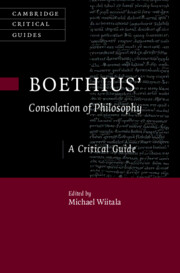Book contents
- Boethius’ Consolation of Philosophy
- Cambridge Critical Guides
- Boethius’ Consolation of Philosophy
- Copyright page
- Contents
- Contributors
- Abbreviations of Boethius’ Works
- Introduction
- Chapter 1 Boethius’ Philosophiae consolatio
- Chapter 2 The Ascent from Π to θ, or On Philosophy’s Teaching a Blind Man to See
- Chapter 3 Lady Philosophy as a Feminine Personification of Wisdom
- Chapter 4 Boethius’ Christianity in the Consolatio
- Chapter 5 The Blending of Pagan and Christian Elements in Book III of the Consolatio
- Chapter 6 The Human Person in the Consolation of Philosophy
- Chapter 7 Self-Investigation, Self-Knowledge, and Inner Conflict in Boethius’ Consolation of Philosophy
- Chapter 8 What It Means to Be a God
- Chapter 9 A Consolation through Philosophical Insight?
- Chapter 10 Being and Existence in the Consolation of Philosophy
- Chapter 11 Circle and Sphere Metaphors for God’s Nature and Providence in Boethius’ Consolation of Philosophy and Dionysius’ On Divine Names
- Chapter 12 Time and Eternity in the Consolation of Philosophy
- Chapter 13 Boethius on Human Freedom and Divine Foreknowledge
- References
- Index
- Cambridge Critical Guides
Chapter 7 - Self-Investigation, Self-Knowledge, and Inner Conflict in Boethius’ Consolation of Philosophy
Published online by Cambridge University Press: 23 May 2024
- Boethius’ Consolation of Philosophy
- Cambridge Critical Guides
- Boethius’ Consolation of Philosophy
- Copyright page
- Contents
- Contributors
- Abbreviations of Boethius’ Works
- Introduction
- Chapter 1 Boethius’ Philosophiae consolatio
- Chapter 2 The Ascent from Π to θ, or On Philosophy’s Teaching a Blind Man to See
- Chapter 3 Lady Philosophy as a Feminine Personification of Wisdom
- Chapter 4 Boethius’ Christianity in the Consolatio
- Chapter 5 The Blending of Pagan and Christian Elements in Book III of the Consolatio
- Chapter 6 The Human Person in the Consolation of Philosophy
- Chapter 7 Self-Investigation, Self-Knowledge, and Inner Conflict in Boethius’ Consolation of Philosophy
- Chapter 8 What It Means to Be a God
- Chapter 9 A Consolation through Philosophical Insight?
- Chapter 10 Being and Existence in the Consolation of Philosophy
- Chapter 11 Circle and Sphere Metaphors for God’s Nature and Providence in Boethius’ Consolation of Philosophy and Dionysius’ On Divine Names
- Chapter 12 Time and Eternity in the Consolation of Philosophy
- Chapter 13 Boethius on Human Freedom and Divine Foreknowledge
- References
- Index
- Cambridge Critical Guides
Summary
The Consolation presents two especially puzzling features that make its exegesis particularly challenging. Literarily, it adopts an uncommon style for a philosophical text, the prosimetrum, which combines prose with poetry. Content-wise, it develops a cogent philosophical message that, perplexingly, is conveyed in a labyrinthine way. These exegetical difficulties disappear if we interpret the Consolation as a form of self-examination grounded in Neoplatonic philosophy. The meandering way in which the text expresses its message illustrates Boethius’ inner conflict brought about by his sudden political fall. The root cause of his conflict is an unresolved tension within the Neoplatonic account of the human soul: the difficulty of reconciling our material self with our divine self. The Consolation’s highly unusual combination of prose and poetry is steeped in some of the basic principles of Neoplatonic pedagogy.
Keywords
- Type
- Chapter
- Information
- Boethius’ ‘Consolation of Philosophy’A Critical Guide, pp. 116 - 134Publisher: Cambridge University PressPrint publication year: 2024

